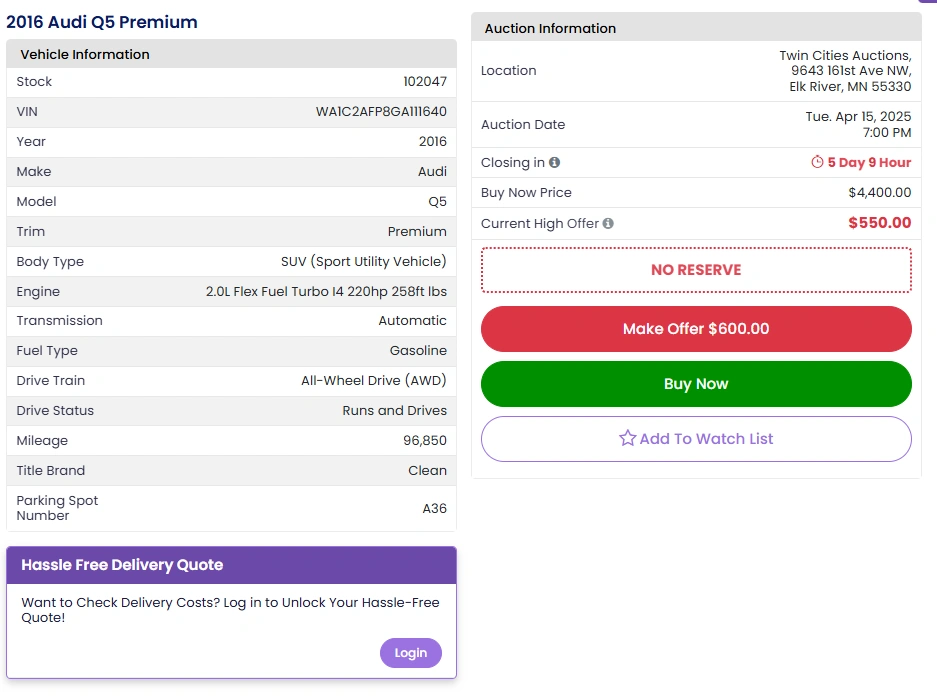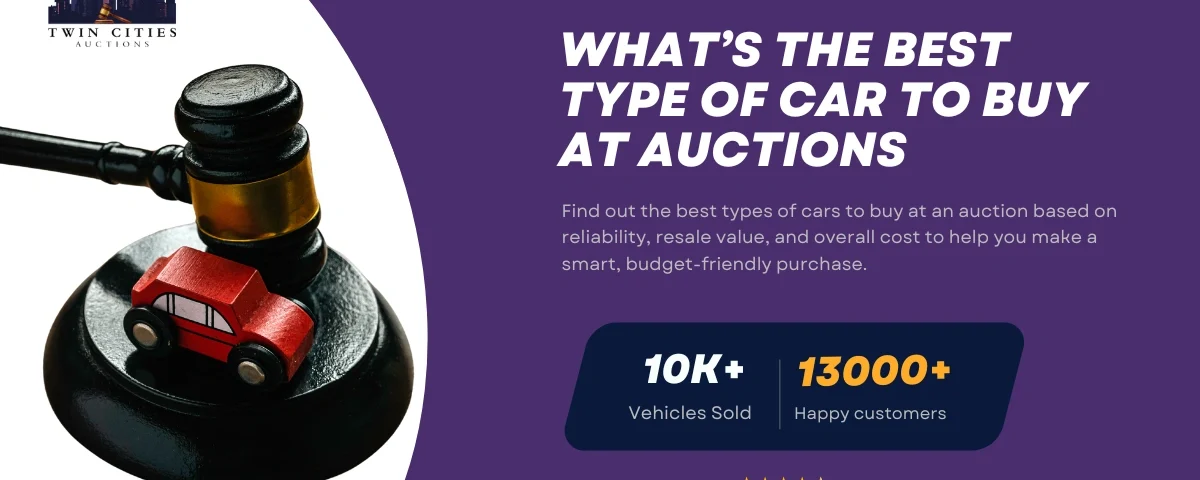U.S. auto auctions move over 9 million vehicles each year, offering tremendous opportunity for both everyday drivers and serious investors.
Whether you seek a dependable commuter, a low-risk Certified Pre-Owned model, a high-upside salvage project, or a classic destined for long-term appreciation, selecting the right category, and avoiding common pitfalls, is essential.
This guide covers top car types, key investment factors, selection criteria, payment strategies, and mistakes to sidestep so you can bid smartly at Twin Cities Auctions or any reputable platform.

Key Takeaways
- Auctions move over 9 million vehicles annually, presenting lucrative sourcing opportunities for all buyer types.
- Understanding car categories and matching them to your goals ensures smarter, more profitable bids.
- Evaluating ROI through depreciation, demand, and repair costs is essential for long-term success.
- A detailed pre-bid checklist helps you avoid hidden costs and title issues.
- Financing options and payment methods vary by auction platform and transaction size.
- Avoiding common pitfalls like overbidding, repair underestimation, or ignoring title status protects your margins.
Top Auction Car Categories
Auctions feature a spectrum of vehicle types—each with its own risk-reward profile. Understanding their characteristics helps match your skills and goals to the right investment.
1. Clean-Title Used Cars
Ideal for beginners seeking reliable daily drivers at wholesale prices. They carry no title issues, require minimal reconditioning, and benefit from broad parts availability. Expect moderate ROI as depreciation slows.
2. Certified Pre-Owned (CPO)
Late-model vehicles that undergo multipoint inspections and carry factory warranties. They command a small premium but deliver peace of mind, low downtime, and stronger resale values.
3. Salvage/Rebuilt Projects
Total-loss vehicles sold at deep discounts—perfect for advanced buyers with repair expertise. Potential for high returns exists if you can restore structural integrity and pass rebuilt-title inspections.
4. Classic & Collector Cars
Rarity and nostalgia drive long-term appreciation. These require expert knowledge of provenance, condition grading, and market trends. Maintenance and storage costs can be significant.
5. Specialty Imports & Exotics
Niche demand can yield windfall profits, but pricing is volatile. High insurance, parts scarcity, and buyer fees demand expert evaluation and tight exit plans.
| Category | Typical Price Range | ROI Potential |
|---|---|---|
| Clean-Title Used Cars | $3,000–$15,000 | Moderate (5–10%) |
| Certified Pre-Owned (CPO) | $15,000–$40,000 | Stable (4–8%) |
| Salvage/Rebuilt Projects | $1,500–$10,000 | High (10–25%) |
| Classic & Collector Cars | $20,000–$200,000+ | Long-term (variable) |
| Specialty Imports & Exotics | $30,000–$250,000+ | Volatile (variable) |
Evaluating Investment Potential
Not all vehicles appreciate equally. Analyze these factors to forecast your return:
- Depreciation Curve: New cars lose value fastest in years 1–3; models older than five years often stabilize or even appreciate, especially limited editions.
- Market Demand: High demand for fuel-efficient crossovers or rising interest in classics can boost resale. Track auction volume trends and consumer reports.
- Maintenance & Repair Costs: Luxury and exotic brands incur higher parts and labor expenses—subtract these from potential gains.
- Rarity & Collectibility: Limited-production runs, landmark anniversaries, and motorsport pedigrees can drive long-term value.
- Insurance & Registration: Exotic or salvage-title cars carry higher premiums and may face registration hurdles—get quotes before bidding.
| Factor | Value Impact | Buyer Tip |
| Depreciation Curve | Determines holding period for max ROI | Target models after steep depreciation slows |
| Market Demand | Governs quick-turn sales vs. long holds | Use auction data and industry forecasts |
| Maintenance Costs | Erodes profit margins on repair-intensive models | Research common service intervals and parts costs |
| Rarity & Collectibility | Boosts long-term appreciation | Verify serial numbers and authenticity |
| Insurance & Registration | Affects net returns on exotics/salvage titles | Obtain insurer pre-approval for your intended use |
Key Selection Criteria
Use this checklist to vet each auction lot before you bid:
- Reliability & Parts Availability
Favor models with ample aftermarket support and straightforward repairs. - Market Demand & Resale Trends
Confirm strong resale interest via Kelley Blue Book and NADA Guides. - Insurance & Registration Costs
Salvage and exotic titles can trigger higher insurer rates—seek pre-approval. - Expected Repair/Refurbishment Needs
Estimate parts and labor by analyzing condition reports and known model issues. - Budget vs. Potential Profit
Calculate total cost (hammer price + fees + repairs + transport) and compare to expected resale price.
How to Evaluate Auction Listings
- Review Condition Reports: Decode damage and wear codes for precise risk assessment.
- Check Vehicle History: Run the VIN through NMVTIS or NICB’s VINCheck for title brands and loss history.
- Compare Recent Sale Prices: Look up past sale results for identical year/make/model/mileage combinations.
- Commission Pre-Purchase Inspections: When available, hire a trusted mechanic to certify mechanical and structural health.
Financing and Payment Options
Knowing accepted methods and associated costs ensures you can complete transactions smoothly:
| Payment Method | Accepted by Auctions | Speed | Typical Fees |
| ACH/Electronic Transfer | ACV Auctions & others | 1–5 business days | Usually none |
| Dealer Floorplan | Dealer-only auctions | Immediate confirmation | Lender-specific rates |
| Cashier’s Check | All reputable auctions | Immediate on deposit | Bank issuance fee |
| Wire Transfer | Common for high-value | 1 business day | Bank transfer fee |
Auctions generally require a refundable deposit (5–10% of anticipated bid) to qualify. For high-value investments, consider escrow services to protect both buyer and seller until title and funds transfer.
Common Mistakes to Avoid
Seasoned bidders still fall prey to these ROI pitfalls:
- Overlooking Total Cost: Neglecting buyer’s premiums, recon, transport, and taxes.
- Skipping Title Checks: Missing salvage, flood, or lemon-law brands.
- Chasing Rare Finds: Overpaying for low-demand or niche models.
- Underestimating Repairs: Miscalculating parts availability and labor time.
- Impulsive Bidding: Letting excitement push you past your cap.
- Neglecting Market Trends: Bidding without current price and demand data.
- Ignoring Seasonal Demand: Paying more during peak auction seasons.
- Poor Exit Planning: Lacking transport, payment, or storage logistics post-sale.
Why Auctions Are a Smart Choice for Car Purchases
Auctions can be an excellent source for late-model vehicles with clear chains of title and affordable pricing. Twin Cities Auctions, based in Minnesota, is one such reputable auction house that offers a wide range of vehicles at competitive prices.
Key Benefits of Buying from Auctions:
- Wide Selection: Auctions like Twin Cities Auctions offer a variety of vehicles, from low-budget cars to high-end models.

- Competitive Pricing: Auctions often offer vehicles at prices below retail value, enabling dealers to maximize their profit margins.

- Transparency: Auctions provide full vehicle history reports, so you know exactly what you’re buying.

- Convenient Bidding: Many auctions offer online bidding for your convenience, making it easier to source vehicles without being physically present.
Twin Cities Auctions: A Smart Vehicle Sourcing Choice
For those in the automotive industry, Twin Cities Auctions offers an excellent platform for sourcing quality vehicles at competitive prices.
Whether you are just starting or expanding your business, this auction house provides transparency, competitive pricing, and a broad selection.
| Feature | Description |
| Inventory Variety | Wide range of cars, trucks, and SUVs available |
| Competitive Pricing | Below-market pricing allows for higher profit margins |
| Vehicle History Reports | Detailed history reports for every vehicle |
| Online Bidding | Convenient online bidding options for dealers |
| Financing Options | Financing available to help with inventory purchases |
Conclusion
Selecting the best auction car requires aligning your goals, daily reliability, warranty coverage, project potential, or long-term appreciation with the right category.
By evaluating depreciation curves, market demand, maintenance costs, and title history, and by leveraging transparent auctions and disciplined bidding, you’ll maximize your return on investment and confidently secure your ideal vehicle.
Public Auctions Made Easy with Twin Cities Auctions
At Twin Cities Auctions, we strive to simplify the public auction process for everyone. You don’t need a dealer license to buy or sell cars here. Our online auctions are designed to be user-friendly and open to the public, ensuring that individuals of all experience levels—from novice buyers to experienced sellers—can participate with ease.
With a focus on transparency and ease of use, we provide all the tools and support you need to confidently participate in the auction process. Start your car buying or selling journey with us today and experience how straightforward and effective our auction system can be!
Looking for more options? Explore our comprehensive list of all available car auctions across the United States. Your next deal might be just a click away!
FAQ
Which auction cars appreciate fastest?
Classic and limited-run collector cars often yield the highest long-term returns when properly restored and marketed.
Can I finance an auction purchase?
Yes. ACH/electronic transfers, dealer floorplans, cashier’s checks, and escrow services are common; confirm terms with your lender.
How do I arrange a pre-sale inspection?
Contact the auction’s support team or a certified third-party inspector during the preview window—usually a day before sale.
What fees should I anticipate?
Buyer’s premiums, recon/detailing fees, transport, title/registration, and sales tax—include all in your max bid.
How long until I can resell for profit?
Timing varies: clean-title used cars may flip in weeks, while classics typically require years to appreciate significantly.
Source Links
https://www.naaa.com/about_us/all_about_auctions/chapter2.html
https://support.acvauctions.com/articles/pricing-and-fee
https://www.nadaguides.com/Reviews/Why-You-Should-Use-NADA-Guides


